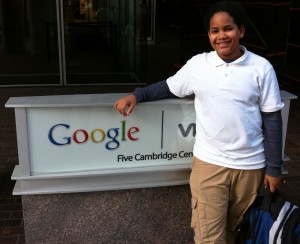The Power of a Catalyst
Elizabeth Black is a first year Teaching Fellow at the Orchard Gardens K-8 School in Roxbury, Massachusetts.
At Orchard Gardens K-8 School in Roxbury, Massachusetts, where I serve as an AmeriCorps Teaching Fellow, 90% of the student body qualify for free and reduced lunch. Most of my students are English language learners, and many come from immigrant families. That day, when Frank first walked into my classroom, he challenged any preconceptions (or misconceptions) I had about students who come from low-income communities. He has continued to do so every day.
On October 17th, Frank went with Professor Sue Freeman of Northeastern University, the volunteer "Citizen Teacher" who led that Solar Cars class, to Google’s headquarters in Cambridge. This was a special opportunity to teach back what he had learned. The special event marked the launch of Citizen Schools’ Catalyst Initiative, which will bring 7,500 professionals in science and technology fields into middle schools like Orchard Gardens.
In this hub of technical ingenuity, Frank described different ways to power a vehicle, showing off paper boats powered by wind and cars made of CDs and rubber bands. But Frank did not need props to captivate the guests drawn to his booth. His energy and obvious interest were enough to engage Google employees and Fidelity financiers.
Then, as I stood at the back beaming, I heard him depart from the topic of the night and bring up the presidential debate he had watched the previous evening. With the authenticity and innocence of a 13-year-old, Frank recounted the moment in the town hall debate that meant the most to him: when a college student asked the candidates what they were going to do to create jobs for college graduates. The candidates talked about investing in alternate forms of energy and the number of jobs that would be created to support that initiative.
“Since I am going to be an engineer,” he said, “and I already know about alternate energy vehicles—and I built a solar car last year—I was thinking, by the time I graduate college, there are going to be a lot of jobs for me!”
I stood in awe. The ability to take something of national concern and bring it down to his level, knowing the steps he needs to take to be successful, the connection between something he learned in middle school translating to a career after college—these are the moments we as teachers hope to inspire. These are the moments that become catalysts for success.
That evening, Frank changed the way I think about teaching. Perhaps we underestimate the very same students whom we are trying to teach. I never thought any of my 7th graders would tune-in to the debates, let alone understand the politics. Once again, Frank surprised me.
Because of his words, I am more intensely aware of each of my students. What can I do so that Randy connects his love of movie special effects to a career in technology and engineering? How can I show Camila that her perfect scores in vocabulary will help her in medical school because she wants to become a doctor?
With the right opportunity, Frank was able to make a remarkable connection between his interests and his future. All children deserve the same.
For more information about how you or your company can become a Catalyst, email Nicole Quinlan at nicolequinlan@citizenschools.org. Continue the conversation and read more stories like Frank's on Twitter with the hashtag #CatalystMoment.

